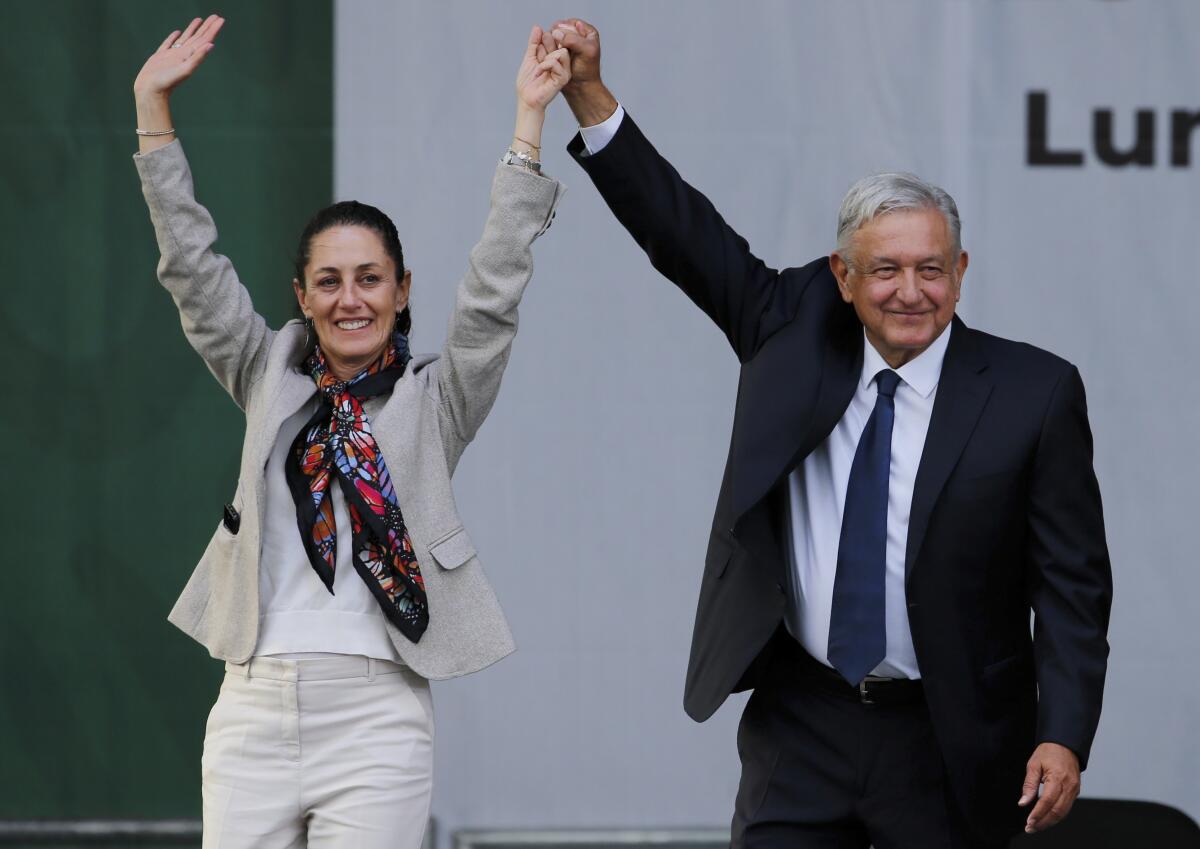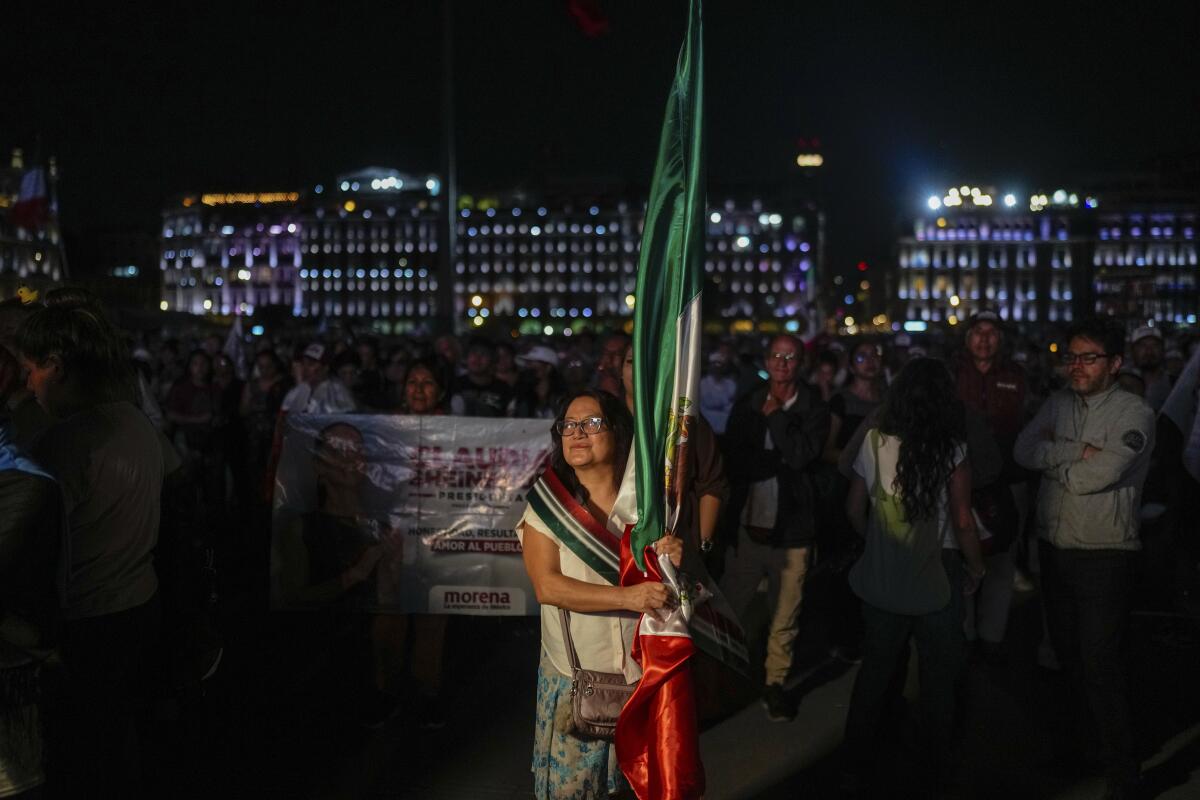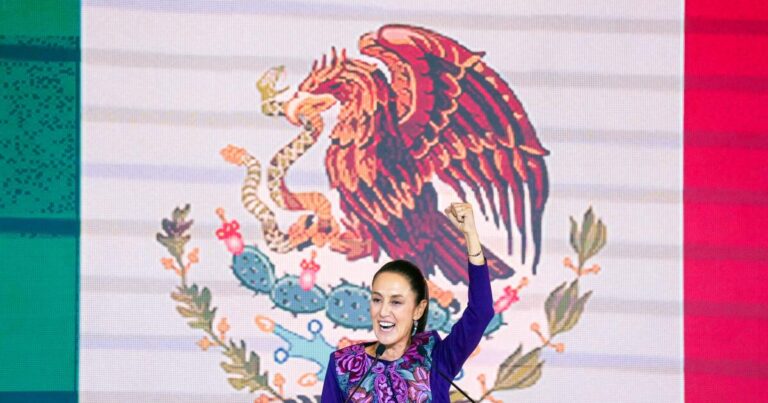Mexico has elected its first female president, a U.S.-educated meteorologist and former mayor whose landslide victory Sunday reflected the continuing dominance of the country’s ruling party and major strides for women in the country’s political ranks.
It is no coincidence that Mexico has a female leader ahead of the United States and most other countries in the world.
Mexico has long required political parties to ensure that women make up at least 50 percent of all candidates in federal, state and municipal elections.
This has transformed politics: More than half of parliamentarians and almost a third of state governors are women, as are the heads of the Supreme Court and the ministries of the interior, education, economy, public security and foreign affairs.
Political scientists say female leaders have helped push through some of Mexico’s most progressive policies, including a federal law giving domestic workers social security rights and decriminalizing abortion in several states before the Supreme Court ruled last year that it should be legal nationwide.

Supporters of President-elect Claudia Scheinbaum celebrated early Monday in Mexico City’s main square, the Zocalo.
(Marco Ugarte/The Associated Press)
Claudia Scheinbaum’s election shattered the last glass ceiling in politics in a country where women were barred from voting until 1954 and where a culture of sexism and high rates of violence against women remain endemic.
“I am the first woman president in the 200-year history of the Mexican Republic,” Sheinbaum, 61, told supporters in her acceptance speech Sunday night, describing her win as a victory for all women.
“I didn’t come alone,” she said. “We all came together.”
She will be sworn into office on Oct. 1 and take the helm of a prosperous but increasingly divided nation plagued by gang violence.
Sheinbaum vowed to continue the path set by outgoing President Andrés Manuel López Obrador, the populist known widely as AMLO, who helped reduce poverty by doubling the minimum wage and expanding the country’s welfare system but also gave extraordinary new powers to the military and failed to curb drug cartel violence.
She has supported some of the most controversial proposals, including a series of constitutional changes that critics fear would undermine democratic checks and balances.
Her astonishing margin of victory – she received more than double the votes of her main rival – was widely seen as a vote of confidence in Lopez Obrador and the party he founded, Morena.

President Andrés Manuel López Obrador greets supporters with then-Mexico City Mayor Claudia Scheinbaum in 2019.
(Fernando Llano/The Associated Press)
But how Scheinbaum overcomes his long shadow is already a central question of her presidency: Though Lopez Obrador has vowed to retire from politics, many wonder whether he will find a way to remain in the conflict that has animated him for his entire adult life.
Meanwhile, Scheinbaum rejects as sexist the suggestion that she is a puppet of the former president. “There’s a shade of misogyny and machismo there,” she said in an interview.
Veteran Mexican journalist Jorge Cepeda Patterson suggested Scheinbaum faces many challenges.
“The generals, trade union leaders, party leaders, and chamber of commerce managers are not only men, but also culturally they operate according to patriarchal norms,” he wrote in the Spanish newspaper El Pais.
Scheinbaum owes his political career to Lopez Obrador, who, as mayor of Mexico City, plucked the university professor out of academia and appointed him environment minister.
He then encouraged him to run in successive elections, which saw Mr. Scheinbaum rise to his previous position as mayor of the capital and then, in turn, to succeed him as president.
In her campaign speeches, Sheinbaum routinely calls her political mentor “the best president Mexico has ever had” and, borrowing his slogan, promises to “put the poor first.”
“It’s hard to believe that Lopez Obrador will completely distance himself from politics,” said Lila Abed, acting director of the Mexico Institute at the Wilson Center in Washington, “but he will probably distance himself from politics.” [Sheinbaum] To take a position on a particular issue.”
One is energy policy, where President Lopez Obrador has invested billions of dollars in refinery projects and shored up the struggling state-run oil giant Pemex.
When asked how his policies would be different, Scheinbaum inevitably refers to his overall scientific background, which includes a PhD in environmental engineering and four years of research at Lawrence Berkeley National Laboratory in California.
“I’m a scientist and I’ve always worked for renewable energy sources,” she told the Los Angeles Times in an interview last year. “I’m a woman, and I believe that scientific progress is part of national progress.”
Her adherence to science was evident even early in the pandemic, when President Lopez Obrador ignored social distancing recommendations and traveled around the country interacting with worshippers, hugging and kissing supporters and urging his compatriots to continue eating in restaurants.
Scheinbaum, who was mayor of Mexico City at the time, was one of several people who allegedly worked behind the scenes to persuade the president to change course and encourage mask wearing and increased caution.
“She urged people to wear masks, locked down cities and supported social distancing when AMLO was saying the opposite,” Abed said.
Experts also said Sheinbaum was likely to take a stronger stance than his predecessor on gender issues, an area that activists have repeatedly accused Lopez Obrador of downplaying.
Their criticism was often directed at Scheinbaum, who has been vocal about violence against women and the grim statistic that an average of 10 women are murdered every day.
In 2022, she campaigned for the arrest and prosecution of suspects in one of the country’s most high-profile cases, the murder of Ariadna Fernanda Lopez Ruiz, whose abused body was found abandoned on a highway outside the capital. Sheinbaum later alleged a cover-up by state prosecutors who were indicted in the case.
Early vote counts suggested that Scheinbaum received more votes than any candidate in decades.
As of Monday afternoon, she had won with 59 percent of the vote, compared with 28 percent for her nearest rival, former senator Xochitl Gálvez Ruiz, who is largely united as the candidate of the opposition coalition running against López Obrador.
It’s been clear for months that Mexico would elect a female president, with two women as leading candidates.

Supporters of President-elect Claudia Scheinbaum wait for her arrival in Mexico City’s main square, the Zocalo, early Monday morning after the election.
(Matthias Delacroix/Associated Press)
Many praised the work of activists who brought about the gender quotas, an initiative that dates back to the country’s transition to democracy.
After more than 70 years of rule by the Institutional Revolutionary Party, politicians began changing laws in the 1990s to make elections fairer. Feminist activists saw an opportunity.
Lawmakers first set a mandatory quota of 30 percent for women candidates in the 2003 elections, then raised that threshold to 40 percent for the 2009 elections.
For a while, political parties tried to get around this requirement by fielding women in weaker districts or by making backroom deals for female candidates to step down and make way for men if they were elected.
In response, women politicians from all ideologies formed coalitions to fight back., They take political parties to court and pressure electoral authorities to tighten quota rules.
Fewer than a third of UN member states have had a female leader, according to an analysis by the Pew Research Center.
Jennifer Piscopo, a professor of gender and politics at the University of London who studies Mexico, said her research shows that having women in office shapes not just policy but culture as well.
“Even if it doesn’t solve all the issues of gender equality, I think it’s important that no little girl thinks a woman can’t be president of Mexico,” she said.
Cecilia Sanchez Vidal in The Times’ Mexico bureau contributed to this report.

